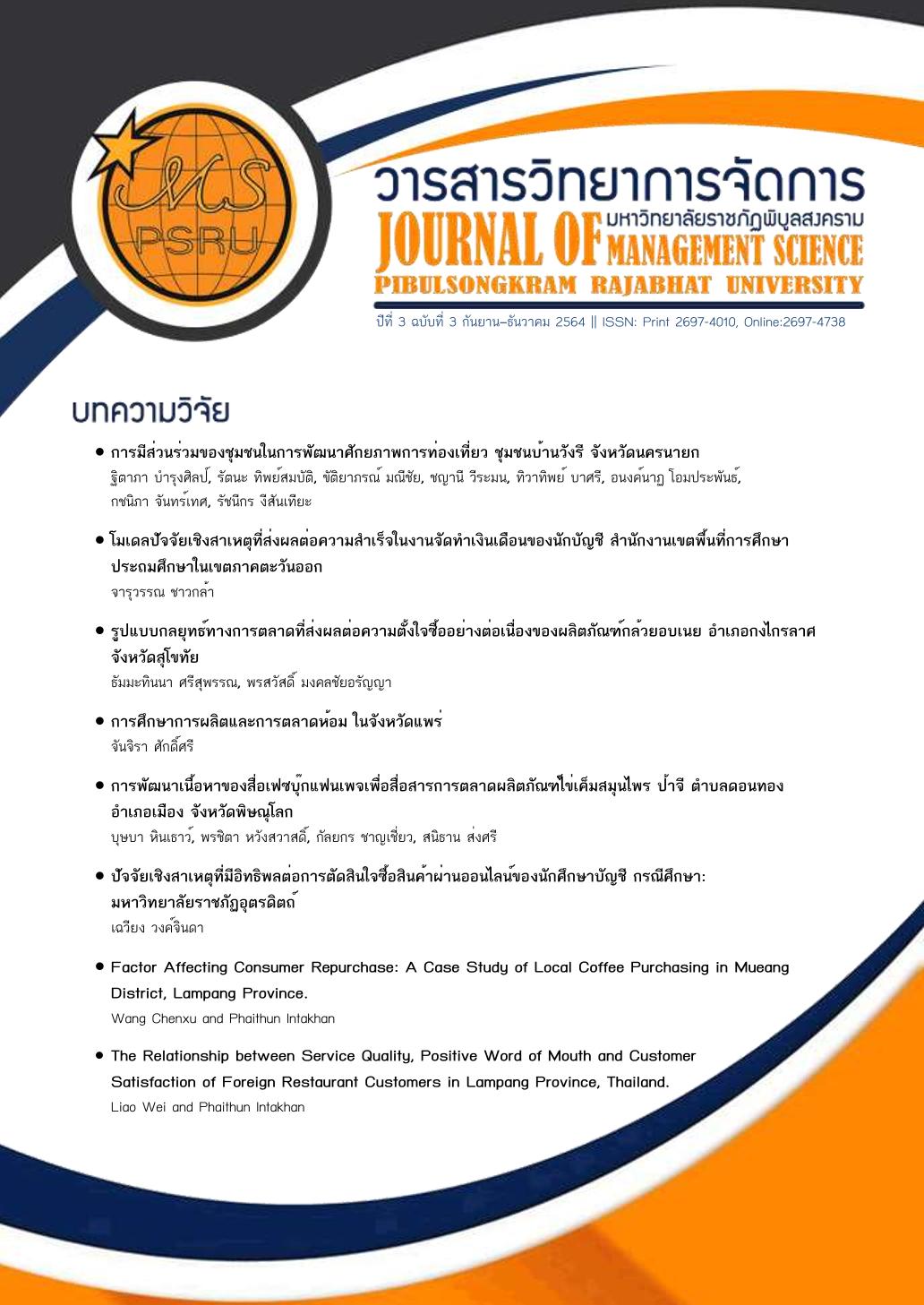ปัจจัยเชิงสาเหตุที่มีอิทธิพลต่อการตัดสินใจซื้อสินค้าผ่านออนไลน์ของนักศึกษาบัญชี กรณีศึกษา: มหาวิทยาลัยราชภัฏอุตรดิตถ์
คำสำคัญ:
การคัดเลือกสินค้า, ส่วนลดราคา, การรับรู้คุณค่าของสินค้า, การตัดสินใจซื้อสินค้าผ่านออนไลน์, นักศึกษาบัญชี, มหาวิทยาลัยราชภัฏอุตรดิตถ์บทคัดย่อ
การวิจัยครั้งนี้มีวัตถุประสงค์เพื่อศึกษาอิทธิพลของการคัดเลือกสินค้า ส่วนลดราคาที่มีต่อการรับรู้คุณค่าของสินค้าและการตัดสินใจซื้อสินค้าผ่านออนไลน์ โดยใช้แบบสอบถามเป็นเครื่องมือในการเก็บรวบรวมข้อมูลจากนักศึกษาบัญชี มหาวิทยาลัยราชภัฏอุตรดิตถ์ จำนวน 373 คน ซึ่งแบบสอบถามมีค่าสัมประสิทธิ์ความเที่ยงอยู่ระหว่าง 0.930-0.945 และได้นำเทคนิคการวิเคราะห์โมเดลสมการโครงสร้าง (SEM) ด้วยโปรแกรมลิสเรลมาใช้ในการวิเคราะห์ข้อมูลการวิจัย ผลการวิจัยพบว่า ส่วนลดราคาเป็นปัจจัยเชิงสาเหตุที่มีอิทธิพลทางตรงต่อการรับรู้คุณค่าของสินค้ามากที่สุดและรองลงมาพบว่าการรับรู้คุณค่าของสินค้ามีอิทธิพลทางตรงต่อการตัดสินใจซื้อสินค้าผ่านออนไลน์ นอกจากนี้ผลการวิเคราะห์ข้อมูลยังพบว่า โมเดลการวิเคราะห์มีความสอดคล้องกับข้อมูลเชิงประจักษ์ซึ่งแสดงถึงโมเดลมีความเหมาะสมพอดีกับข้อมูลเชิงประจักษ์อยู่ในเกณฑ์ดี ดังนั้น เจ้าของธุรกิจควรพัฒนาสินค้าให้มีแบรนด์สินค้า ประเภทของสินค้า และคุณภาพของสินค้าที่หลากหลายและสร้างกลยุทธ์ส่วนลดราคาเพื่อตอบสนองต่อลูกค้าให้ตัดสินใจซื้อให้ดีขึ้น โดยเจ้าของธุรกิจที่ต้องการให้เกิดประสิทธิภาพในการตัดสินใจซื้อสินค้าผ่านออนไลน์ควรให้ความสำคัญกับการสร้างส่วนลดราคาเป็นอันดับแรก
เอกสารอ้างอิง
มหาวิทยาลัยราชภัฏอุตรดิตถ์. (2564). กองบริการการศึกษา (2564, พฤศจิกายน). รายชื่อนักศึกษาที่ลงทะเบียน,. สืบค้น 2 พฤศจิกายน 2564, จาก http://academic.uru.ac.th/namesj/inputdata.asp
Aaker, D. A., Kumar, V., & Day, G. S. (2001). Marketing Research. New York: John Wiley and Son.
Amanah, D. & Harahap, D.A. (2018). Examining the effect of product assortment and price discount toward online purchase decision of university student in Indonesia. Jurnal manajemen dan kewirausahaan, 20(2), 99–104.
Attaran, B., Notarantonio, E.M., & Quigley, C.J. (2015). Consumer perceptions of credibility and selling intent among advertisements, advertorials, and editorials: a persuasion knowledge model approach. Journal of promotion management, 21(6), 703-720.
Barclay, D., Higgins, C., & Thompson, R. (1995). The partial least squares (PLS) approach to causal modeling: Personal computer adoption and use as an illustration. Technology studies, 2(2), 285-309.
Chow, W.S. & Chan, L.S. (2008). Social network, social trust and shared goals in organizational knowledge sharing. Information and Management, 45(7), 458-462.
Deore, C. & Borade, A. (2020). Influence of discounts on consumer behaviour. A Multidisciplinary peer reviewed journal, 1(1), 106-108.
Esmaili, S., Rezaei, N., Abbasi, R., & Eskandari, S. (2017). The Impact of marketing mix on perceived value, destination image and Loyalty of Tourists (Case Study: Khalkhal City, Iran). Modern applied science, 11(11), 96-108.
Fehrenbach, D. & Herrando, C. (2021). The effect of customer-perceived value when paying for a product with personal data: A real-life experimental study. Journal of business research, 137(2021), 222–232.
Fornell, C. & Larcker, D.F. (1981). Evaluating structural equation models with unobservable variables and measurement error. Journal of Market Research, 18(1), 39-50.
Hair, J.F., Black, W.C., Babin, B.J., & Anderson, R.E. (2010). Multivariate data analysis: A global perspective. (7th ed.). New Jersey: Pearson Education Inc.
Kotler, P. & Armstrong, G. (2016). Principles of marketing. (16th ed.). England: Pearson Education Limited.
Kotler, P. & Keller, K.L. (2016). A framework for marketing management. (6th ed.). England: Pearson Education Limited.
Luo, X. & Lee, J.J. (2018). The effect of post-purchase discount format on consumers’ perception of loss and willingness to return. Journal of asian finance, economics and business, 5(4), 101-105.
Nunnally, J. C. (1978). Psychometric theory. New York: McGraw-Hill.
Nunnally, J. C. & Bernstein, I. H. (1994). Psychometric Theory. (3rd ed.). New York, NY: McGraw-Hill.
Perreault, W.D., Cannon, J.P., & McCarthy, J.E. (2017). Essentials of marketing: A marketing strategy planning approach. (15th ed.). New York: McGraw Hill Education.
Pradhana, F. & Sastiono, P. (2018). Gender differences in online shopping: are men more shopaholic online?. Advances in economics, business and management research, 72(1), 123-128.
Rabo, J. & Ang, M. (2018). Determinants of customer satisfaction in a Philippine retail chain. Paper presented at the DLSU Research Congress 2018, Manila Philippines: De La Salle University.
Schumacker, R. E. & Lomax, R. G. (2010). A beginner’s guide to structural equation modeling. (3rd ed). New Jersey: Lawrence Erlbaum Associates.
Suttikun, C. & Meeprom, S. (2021). Examining the effect of perceived quality of authentic souvenir product, perceived value, and satisfaction on customer loyalty. Cogent business and management, 8(1), 1-19.
Zulfikar, R. & Mayvita, P.A. (2018). The relationship of perceived value, perceived risk, and level of trust towards green products of fast moving consumer goods purchase intention. Jurnal ilmiah bidang akuntansi dan manajemen, 15(2), 1-14.
ดาวน์โหลด
เผยแพร่แล้ว
รูปแบบการอ้างอิง
ฉบับ
ประเภทบทความ
สัญญาอนุญาต
ลิขสิทธิ์ (c) 2021 มหาวิทยาลัยราชภัฎพิบูลสงคราม

อนุญาตภายใต้เงื่อนไข Creative Commons Attribution-NonCommercial-NoDerivatives 4.0 International License.
บทความที่ได้รับการตีพิมพ์ในวารสารวิทยาการจัดการมหาวิทยาลัยราชภัฏพิบูลสงคราม เป็นลิขสิทธิ์ของ คณะวิทยาการจัดการ มหาวิทยาลัยราชภัฎพิบูลสงคราม บทความที่ลงพิมพ์ใน วารสารวิทยาการจัดการมหาวิทยาลัยราชภัฎพิบูลสงคราม ถือว่าเป็นความเห็นส่วนตัวของผู้เขียน คณะบรรณาธิการไม่จำเป็นต้องเห็นด้วย ผู้เขียนต้องรับผิดชอบต่อบทความของตนเอง



